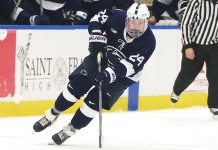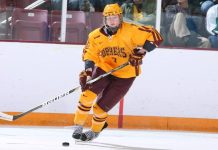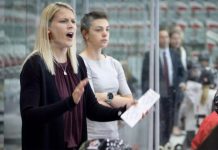For six years, David Quinn was an integral part in building the University of Nebraska-Omaha men’s hockey program.
From the program’s infancy in July 1996 to June 2002, Quinn — then the top assistant under head coach Mike Kemp — spent three weeks a month on the road recruiting. When he was there, he worked with the defensemen to create a reliable unit on the blue line.
For six years, he put everything into building what was the nation’s newest Division I program into a contender for a spot in the NCAA Tournament.
Friday, the Mavericks will realize that dream when they make their first appearance as a No. 4 seed at the DCU Center in Worcester, Mass. And Quinn would like nothing more than for them to lose.
Quinn, now the associate head coach at Boston University, laughed at the irony while sitting in his Agganis Arena office Tuesday. In only his second year at his alma mater, he’s helped BU go 18-1-2 down the stretch to earn the nation’s No. 1 ranking, top seed within the Northeast regional bracket and, as fate would have it, a date with his former team in the NCAA quarterfinals.
“The bottom line is we want to win a national championship here and I think this team is real focused and [Nebraska-Omaha] just happens to be our opponent,” Quinn said. “I have to look at it that way whether I want to or not. Once the puck drops, you don’t have to worry about who is on the other side. You just want to beat them.”
Loyalties aside, Quinn has taken that same approach his whole career. As a player, he proved it as a New England first-team all-star at BU. As a recruiter, he’s won over some of the nation’s top talent, regardless if he was in Omaha, Ann Arbor, Mich., with the National Team Development Program (NTDP) or on Commonwealth Avenue.
Three years ago, he claimed USA Hockey Developmental Coach of Year honors after guiding the U.S. National Under-17 team to two of its most successful seasons in program history. He then took the position under BU coach Jack Parker after associate coach Brian Durocher took over the BU women’s program in 2004.
Two years in, his contributions are being widely felt throughout the program. A former defenseman, Quinny (as he’s called) helped turn BU’s back line into one of Hockey East’s most reliable, not to mention senior Dan Spang into a possible All-American and freshman Matt Gilroy from a forward into a starting blueliner.
Though he didn’t recruit any current Terriers — all six freshmen either committed early or walked on — he’s constructed a rookie class for next season that includes two possible first-round picks in this year’s NHL Draft.
At 39, Quinn is one of the nation’s top young coaches, and as a recruiter, he’ll tell you it takes persistence and a lot of luck to make it. Coincidently, it was exactly luck — some good and some of the worst to wish upon a single man — for him to do just that.
A NEW PATH
Entering his senior season at BU in 1987, Quinn had the potential for greatness. A two-time New England first-team all-star, he’d been selected 13th overall by the Minnesota North Stars in 1984 and was trying out for the 1988 Olympic team. Then, as Parker put it, he was “slapped upside the head.”
A blood test revealed he had Christmas Disease, a rare blood disorder that prevents the blood from clotting properly if a person is cut. For years, he had injuries he couldn’t explain, but it never slowed him. Suddenly, this healthy 6-foot 1-inch, 205-pound defenseman was being told he couldn’t play hockey anymore.
At first, Quinn didn’t take it well.
“I was thinking, ‘I’m going to play in the Olympics, I’m going to play in the NHL for 15 years,'” he said. “Then to have that taken away was difficult to handle.”
But then he realized something. As unlucky as he was to have this disorder, he was even luckier to still be alive. All those years playing hockey, football and baseball — a hard hit here or errant pitch there could have killed him.
“I remember him telling me he was a linebacker at the Kent School [in high school],” Parker said. “And he’d be fending guys off and making tackles during the course of a football game and come Monday, his forearms would be so swelled up, he couldn’t hold a pen. He just thought he wasn’t tough enough.”
Tough was exactly what Quinn was. He remained with the team his senior season as co-captain, and later joined the staff as the junior varsity coach. He attempted a comeback in the three years that followed with the help of new medication, but in 1993 decided to return to coaching, his way of staying with the game.
He was named Northeastern University’s top assistant under coach Ben Smith, and then had a chance encounter with Kemp — who had recruited Quinn as an assistant at the University of Wisconsin in the early 1980s — while coaching at the U.S. Under-17 festival in 1996.
Kemp had just been named the head coach of the Mavericks’ new hockey program and he needed an assistant. A two-hour conversation and plane ride later, Quinn joined Kemp in Omaha.
BUILDING FROM THE GROUND UP
Kemp and Quinn had help in developing the Mavericks’ hockey program. Blessed with great support from the community, they had a home in the Civic Auditorium and a fan base that ate up 6,389 season tickets prior to their inaugural season.
All they needed was players.
Spearheading the team’s recruiting, Quinn brought in balanced classes that helped the team win more than 10 games in its first two years and reach the league final in its first year in the Central Collegiate Hockey Association and only third year of existence.
By the time he left Omaha for the NTDP in 2002, Quinn brought in two All-Americans and four future NHL players in the program’s first seven years. The first to make the NHL was goalie Dan Ellis, who stands as Quinn’s most memorable recruit.
Quinn found Ellis almost by accident when he attended a junior league playoff game in Newmarket, Ontario. Out there for a training camp as coach of the U.S. Women’s National Team, Quinn took the 45-minute drive from Toronto to the game, got the scoop on Ellis from a fan and put the young goalie in contact with the junior team in Omaha, the Lancers of the USHL. One year later, Ellis was on his way to shattering every Maverick record.
“It’s crazy how things like that happen,” Quinn said. “But something like that seems to happen every year.”
Quinn recruited but didn’t coach the seniors on this year’s Nebraska-Omaha team, and he really only has one connection left with the program in Kemp. That’s if you don’t count the foundation he left for every future Maverick team to build upon.
COACH QUINN
As a player, Quinn was blessed with the size, speed and poise to make it as an NHL defenseman. As a coach and recruiter, he’s blessed with something even greater: an uncanny knack to connect with players. Parker raved about Quinn’s infectious personality and the rapport he develops with not only recruits but everyone in the recruiting process — coaches, general managers, parents.
When David Van der Gulik was forced to sit out the first half of this season with a rare groin injury, it was Quinn he could relate to.
“You know, ‘Go tell him your experience,'” Parker told Quinn. “I think that brightened David up a little bit.”
It was also Quinn who played an integral part in turning Gilroy, a long-time forward, into one of the Terriers’ top defensemen. In 34 games, Gilroy ranks third on the team with a plus/minus of +19, and, among regular players, he’s taken a team-low five penalties.
“I guess he was the first defenseman coach I’ve ever had, and he’s been the biggest influence on me this year,” Gilroy said. “He gets on me all the time, but he’s always positive and he’s taught me so much this year.”
Gilroy isn’t the first to have benefited from Quinn’s coaching. And to think, after everything he’s accomplished as a coach, he’s a man who admittedly fell into it.
That’s what you call ironic. But Quinn’s getting his fill of that these days.


